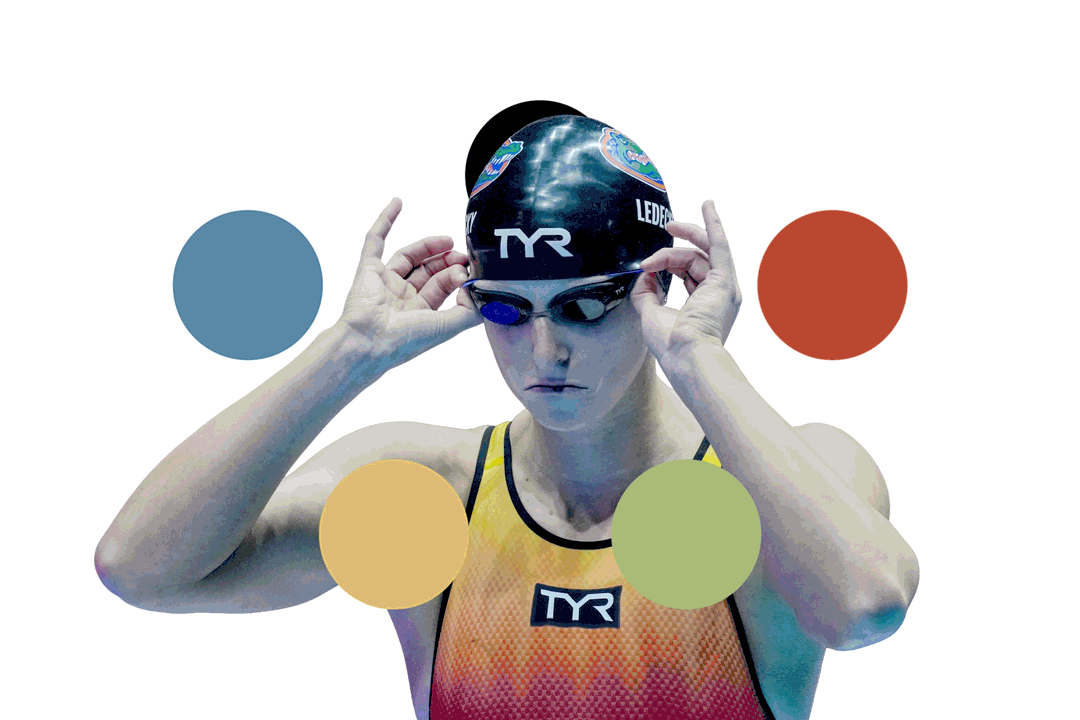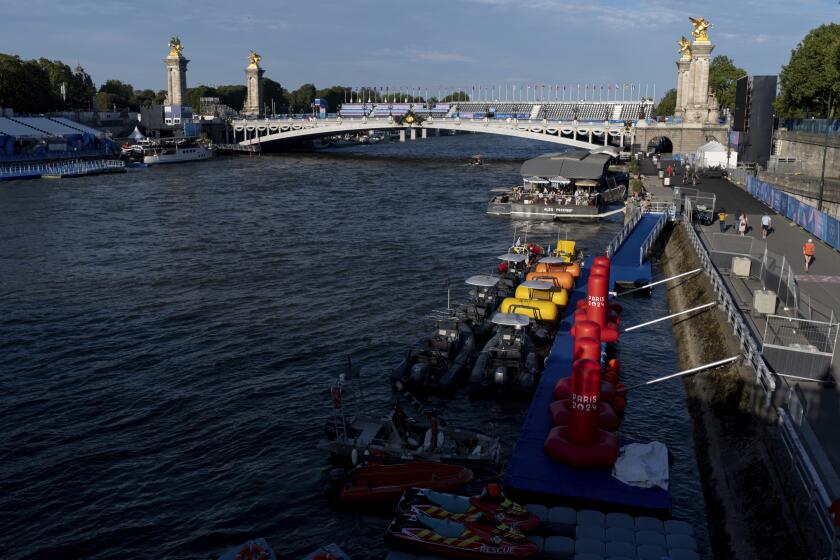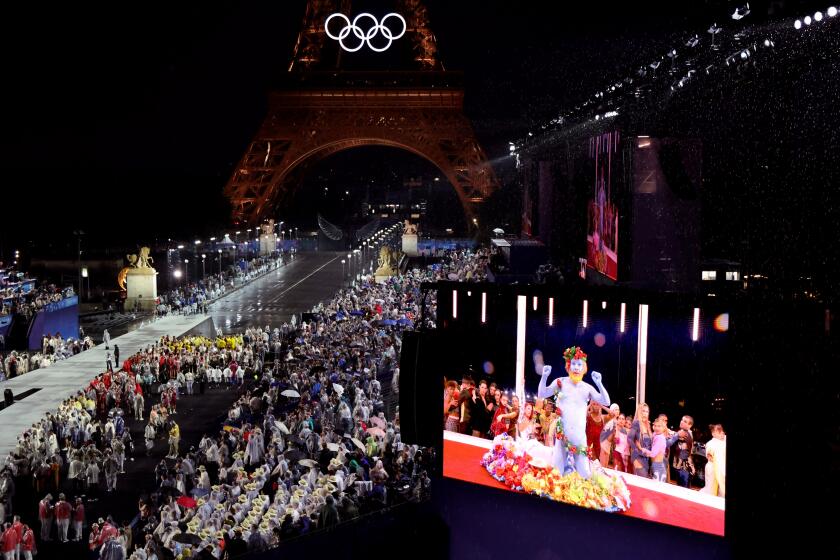The Sports Report Olympics edition: U.S. men’s gymnasts have better stats than Dodgers
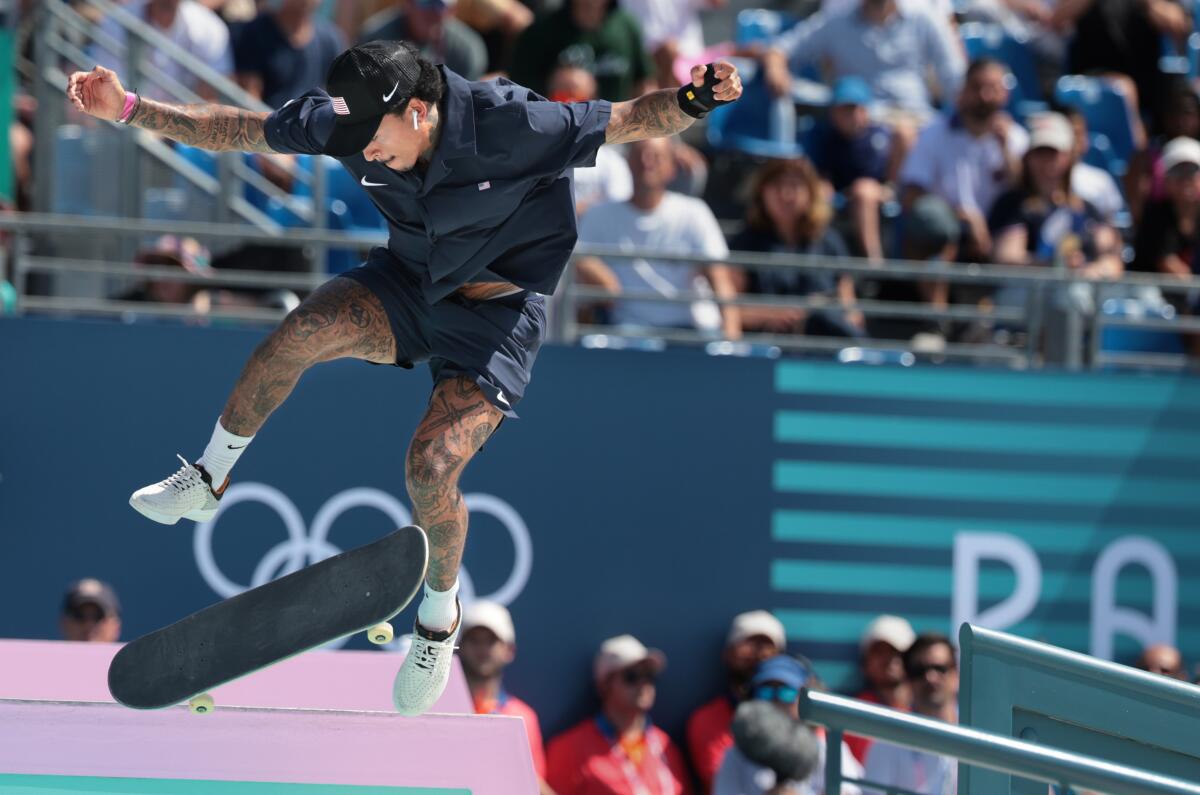
Welcome to your daily Olympic newsletter. I’m your tour guide John Cherwa and I’m wondering why only three of the 20 total medals the U.S. has won are gold. New slogan: Go for the silver and bronze?
We’ll start this newsletter with a mathematical quiz. Which is more rare, the U.S. men’s gymnastics team making it to the medal podium or a Dodgers pitcher under Dave Roberts throwing a complete game?
Well, one way to look at it is the U.S. team, until Monday, hadn’t won a medal since 2008. That’s 16 years. Meanwhile, Gavin Stone threw a complete game on June 26, the first in a year-and-a-half. OK, we know that’s a silly comparison. But you get the point. (And, for the record the U.S. men are at 25% since 2008 and the Dodgers are at 0.7% since Roberts took over in 2012.)
The fact is the U.S. winning the bronze medal in Paris had visions of 2008 as the same two teams beat them, China and Japan in 2008 and the reverse on Monday. But realistically, bronze was about as good as the team could have hoped for.
Go beyond the scoreboard
Get the latest on L.A.'s teams in the daily Sports Report newsletter.
You may occasionally receive promotional content from the Los Angeles Times.
The final hero for the U.S., although they are all heroes, is pommel horse specialist Stephen Nedoroscik. That’s all he does except mug and have fun on the sidelines waiting for his one event. He has received a lot of TV time. He’s — and we mean this in only the most loving way — the nerdy looking guy. (Don’t tell me you weren’t thinking that, too.) He has square-frame glasses and has been known to do a Rubik’s cube while waiting to compete. Those glasses might reach the status of Clark Kent and Kurt Rambis.
He needed a great pommel horse routine to earn the U.S. the medal and that’s what he did. The team erupted (figuratively not actually or we would be writing a very different story) when he landed his dismount. It was the happiest bronze-medal-winning team in quite a while. Our Thuc Nhi Nguyen was there to give you even more on the overall team, right here. And more about Nedoroscik here.
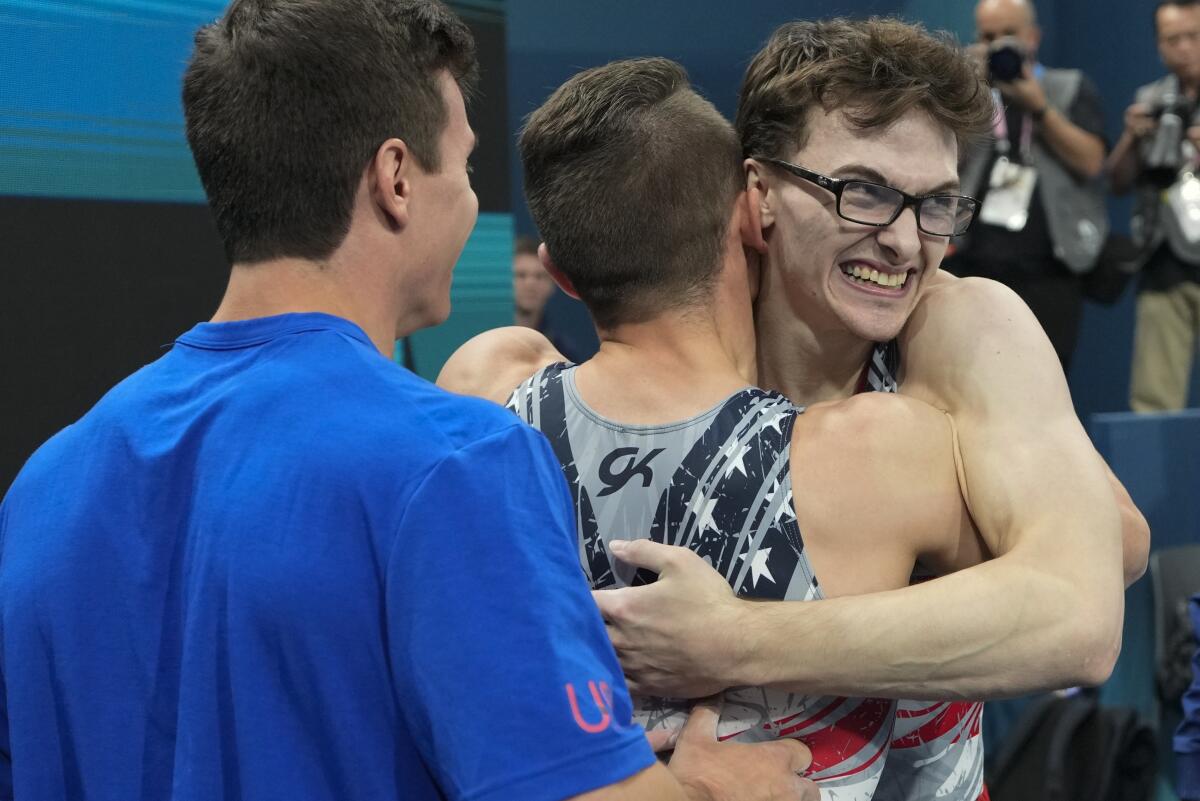
There were other highs and lows from Monday.
—The U.S. picked up four medals in swimming but no golds. Katie Grimes and Emma Weyant went two-three in the women’s 400-meter individual medley; Luke Hobson earned bronze in the men’s 200 freestyle and Ryan Murphy earned bronze in the men’s 100 backstroke. Our Kevin Baxter has all the details, right here.
—The U.S. women’s basketball team extended its Olympic win streak to 56 games with a 102-76 win over Japan.
—It was a bad start for the Olympic champion U.S. women’s volleyball team. It lost a tough five-setter to China. No worries though, it’s only pool play and there’s plenty of time to recover.
—The three-time gold-medal-winning U.S. women’s water polo team started out pool play with a loss to Spain, 13-11. It was only the second loss since 2008 for the U.S. team.
—U.S. skateboarder Nyjah Huston finally earned an Olympic medal but not the one he wanted. He picked up the bronze behind silver medalist and teammate Jagger Eaton. Japan’s Yuto Horigome took the gold.
—In what might be his last match at Roland Garros, tennis legend Rafael Nadal, 14-time winner of the French Open, lost to Novak Djokovic, 6-1, 6-4.
Enjoying this newsletter? Consider subscribing to the Los Angeles Times
Your support helps us deliver the news that matters most. Become a subscriber.
What is it about the order of the IM?
How is the order of different swim strokes decided in the individual medley, you ask? Funny, I was wondering the same thing. According to our uncredited co-host Mr. Google, the order is different in the individual and the team. If it is a single person it goes from slowest stroke to fastest, which means butterfly, backstroke, breaststroke and freestyle.
But it’s different in the team IM. Think about it? It makes sense. It starts with the backstroke because that is the only discipline where the swimmer starts in the water. If it were anyplace but first when the previous swimmer approached the backstroker-in-waiting already in the water it would be like two cars taking the right of way at a four-way stop at the same time. Nowhere to go. After that it goes by slowest to fastest — butterfly, breaststroke and freestyle.
And that, students, concludes today’s swimming fun facts.
If I could turn back time
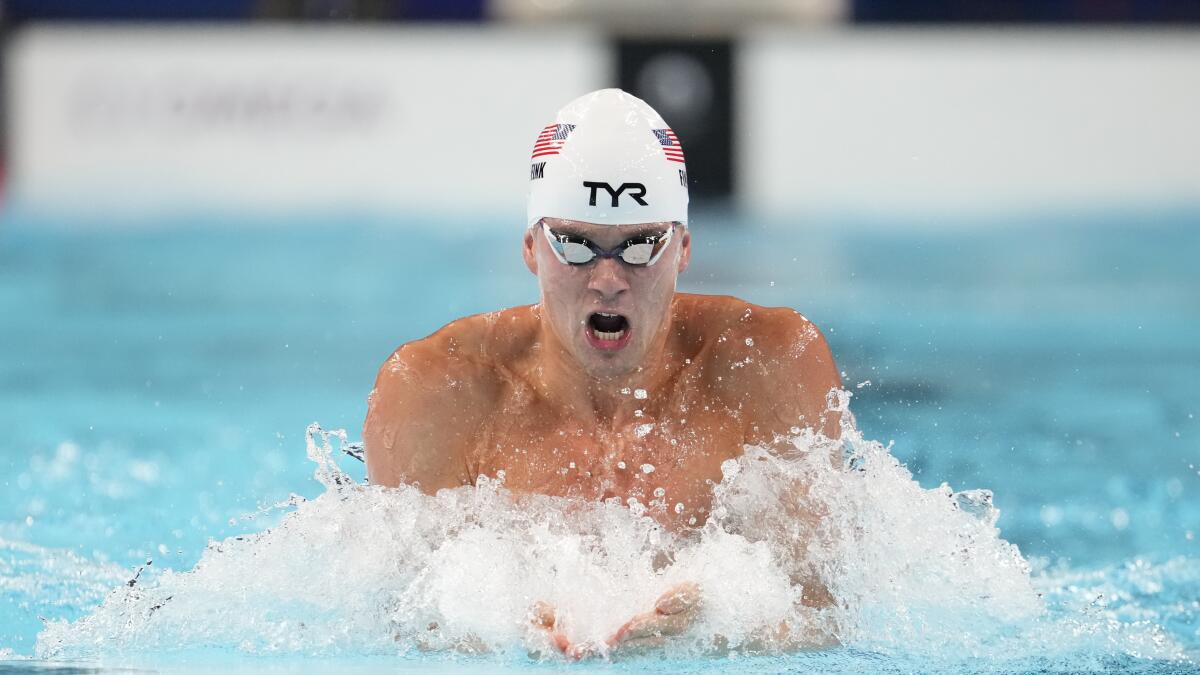
In some versions of Monday’s newsletter, I said Nic Fink of the U.S. won a bronze in the 100 breaststroke. Well, he actually tied for the silver. A very nice promotion. Did you know there is another Finke (silent “e”) on the U.S. team. Well, that would be Bobby Finke, who will be going today in the 800 freestyle final.
So, what if they both had a reservation at the same restaurant but a mixup caused them to only have one “Fink(e).” Who would get it? Why the one with the better medal, of course.
Opening ceremony TV is big
The ratings are in for the opening ceremony and they are good. According to Nielsen and Adobe Analytics, some 29 million people watched the opening over three airings. It’s up 60% from the fan-less opening in Tokyo three years ago, which had 17 million viewers. It’s even up 8% from Rio in 2016, which is also impressive given how fragmented the media landscape has become in eight years.
The modern best performance by an Olympics opening was 2012 when 40.7 million people watched the London opening ceremony highlighted by faux Queen Elizabeth II parachuting into the ceremony.
What to look for today?
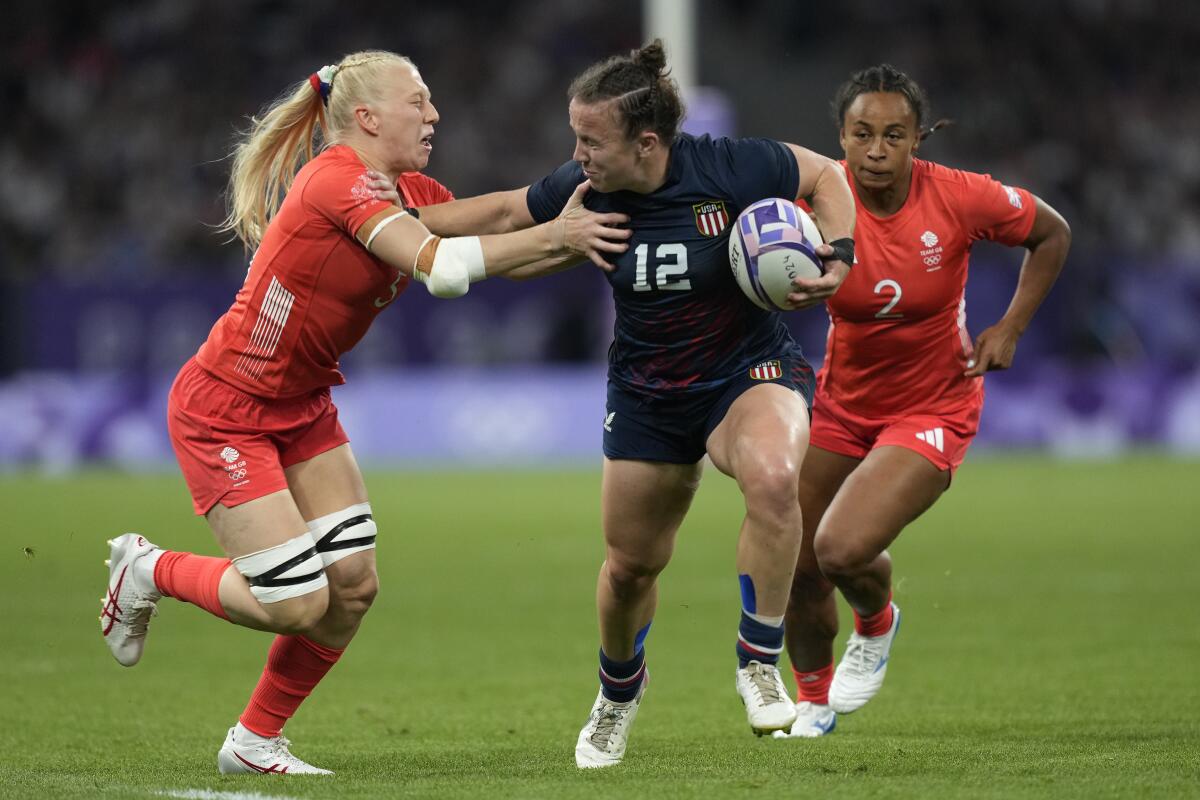
—The big deal, of course, is the women’s team final in gymnastics. Will Simone Biles’ injury be a factor? We’ll find as competition starts around 9:15 a.m. PDT.
—A light day for finals at swimming with the women’s 100 backstroke, which has world-record holder Regan Smith for the U.S.; the men’s 800 freestyle; and the men’s 800 freestyle relay.
—Women’s 3-on-3 basketball starts about 8 a.m. PDT with defending champion U.S. playing Germany. The men start around 1:45 p.m. PDT with a game against Serbia.
—The U.S. women rugby sevens team could make the medal stand Tuesday as it advanced to the semifinals and will play defending champion New Zealand at 6:30 a.m. PDT. A win there, which is a tall order, would put the Americans in the gold-medal match at 12:45 p.m. PDT.
Must-read links
Let’s catch up on some stories you might have missed, but shouldn’t have:
- Paris Olympics TV schedule: Tuesday’s listings
- 2024 Paris Olympics: How to watch every event and the opening ceremony
- Meet Team USA gymnast Stephen Nedoroscik: A new hero in glasses
- Conservatives in uproar over Olympics opening ceremony scene they say mocks ‘Last Supper’
- Ryan Murphy learns ‘it’s a girl,’ earns his third 100-meter backstroke Olympic medal
- Nyjah Huston content he avenged Tokyo flop by earning bronze in Paris street skate
- How the U.S. men’s gymnastics team won its first medal since 2008
- How Céline Dion reacted to her triumphant Eiffel Tower performance at Paris Olympics
- American Lee Kiefer clinches her second consecutive women’s foil gold medal
- Does Caitlin Clark belong on Team USA? Dawn Staley says maybe, ‘if we had to do it all over again’
- Men’s Olympic triathlon postponed amid Seine River water quality concerns
Your TV guide
How can you watch the Games today? Check out Tuesday’s Olympic TV listings.
Until next time...
That concludes today’s newsletter. If you have any feedback, ideas for improvement or things you’d like to see, email me at john.cherwa@latimes.com. To get this newsletter in your inbox, click here.
Go beyond the scoreboard
Get the latest on L.A.'s teams in the daily Sports Report newsletter.
You may occasionally receive promotional content from the Los Angeles Times.

